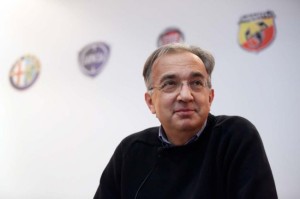The recent Comcast/Time Warner Cable fiasco proved that some mergers aren’t workable, equitable or fair. Still, powerful Comcast came through with its reputation reasonably intact. Part of that has to do with CEO Brian Roberts’ tough-guy pose: he shrugged off the failed deal and went back to work.
There are other acclaimed CEOs, yet they’re anxious. They publicly conduct their internal dialogues, sometimes letting shareholders and the media in on their thoughts. When it’s about a merger and no interested suitor emerges, it can be embarrassing.
Current case in point: Sergio Marchionne, chairman/CEO of Fiat Chrysler Automobiles N.V. (NYSE: FCAU) http://www.marketwatch.com/investing/stock/FCAU. He seems to be learning the hard way that not everybody wants to go into business with a global automaking enterprise that has a checkered history.
Signore Marchionne has been considered a genius by the business press and more recently, by shareholders. Following the financial crisis in 2009, Fiat took Chrysler Corporation off of the U.S. Government’s hands for assumption of debt. Marchionne has since earned profits for the combined company – now FCA – through a rebound of its North American business. FCA recently launched a $3 billion bond offering.
Sales of SUVs and pickup trucks and big cars are very hot, driven by low fuel prices, a decent economy and pent-up demand. FCA’s revamped lineup, particularly Jeeps and RAM trucks, do quite well.
Marchionne has a long history of making grand pronouncements about how bright the future is for FCA. So far, he’s been mostly right. But he now sees clouds in his crystal ball.
During FCA’s Q1 conference call in late April, Marchionne made a case for consolidation that included a 25-page PowerPoint (http://www.fcagroup.com/en-US/investor_relations/events_presentations/quarterly_results_presentations/SM_Fire_investor_presentation.pdf) detailing to the investment community how necessary this is.
But to date, none of the viable takeover or merger partners that FCA might normally be talking to – Peugeot of France, Mitsubishi Motors, Mazda or Suzuki of Japan, for example – have expressed interest.
Since auto manufacturers seen un-enthused,
Bloomberg reported what Marchionne thinks the next logical step is: a possible partnership with Apple or Google. (http://www.thetruthaboutcars.com/2015/04/marchionne-may-marry-fca-apple-google-no-automaker-will) He said:
“I’ve always been intrigued by the notion of having technology disruptors show up in the marketplace and change the paradigm. If they show up and they are truly successful, with their cash piles and know-how, they could fundamentally hurt this industry.
FCA already has an established relationship with Apple, which is working on an electric vehicle supposedly going to market by 2020. Fine, except that Apple shareholders would prefer a deal with Tesla. Apple isn’t commenting, but it’s worth noting that they bought Beats for $3 billion in 2014. Google hasn’t said much about Marchionne’s ideas either.
So Sergio Marchionne, one of the most heralded and talented deal-makers around, finds himself encountering something he isn’t used to: a business media that smells desperation from him:
“Fiat Chrysler Earnings: Profits Are Too Thin For Comfort” – Motley Fool
“Fiat Chrysler Shares Extend Losses After CEO’s Consolidation Call” – Reuters
“Fiat Chrysler Headline Profits Look Good, But Bernstein Research Worries About Threat From Debt” – Wall Street Journal
“Marchionne Talk of Industry Mergers Called Sign of ‘Panic’ ” – Bloomberg
FCA has underused capacity, no sustainable plan for proactive growth, a guaranteed downturn in at least one of its key markets, and eroding credibility. It will need cash soon. These problems have been covered up by the extremely profitable sale of SUVs and trucks in the North American market. But there is a limit to how many sales Jeep and bigger trucks can generate. Incentive costs are going up, and competition is getting fiercer.
Marchionne’s tendency to say what’s on his mind hurts too. He lost credibility last year when pronouncing that another Italian FCA brand, Alfa-Romeo, will sell 400,000 units globally by 2018. In 2015 they will sell a tenth of that, with no products having the mainstream appeal to sell anything near those numbers.
So the question is this: does Marchionne’s tendency to blurt his schemes out publicly still seem shrewd, or maybe a little desperate?
For the FCA minions charged with keeping Marchionne’s “genius” reputation flowing, things have to be tough right now.
